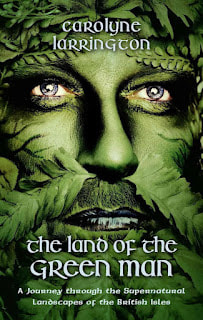 Welcome to my first ever blog post. This is going to be an experience for us both. I have been meaning to do this for a while and I’m sure you have no idea what to expect, so I’ll start by telling you why I’m doing this and what sort of things I envisage writing about. Firstly, it is not going to be about my navel or what’s growing in the garden. Neither is it going to be about life backstage. I want to share some ideas in the work I come across in the course of my research and teaching at the University of Sheffield – this will often involve music making and touring, but I’m trying to approach it as opening questions for discussion and debate rather than purely giving you gossipy tit bits. Sorry if that’s put you right off! I’ve just finished reading a book I think many of you would enjoy by Carolyne Larrington – The Land of the Green Man.* Carolyne is an academic at Oxford St John's and this book is chock full of her research into the folk legends tales and songs of the British Isles. You'll find lots of background to familiar legends here along with new interpretations about what they all mean and she has such a beautiful way of writing, it is very accessible to anyone interested to read it. It particularly interests me because I have just been thinking about why we still sing about all these old themes, and how we tap into stories and characters in traditional song to draw on bigger frames of communal knowledge. That was a strong focus when I was putting Old Adam together, and this book touches on a lot of those same questions. We have such a long and deep heritage to draw on and this book really digs into them. There are chapters involving giant legends, black dogs and death omens; love and lust, which particularly focuses on the characters in ballads and the different kinds of love relationships there are. Fairies and otherworldly matters crop up frequently and an indepth discussion of Orfeo sheds new light for me onto my version of the song. Contemporary references are given too, with a lot of Tolkien, Garner and Harry Potter showing clearly how fantasy writers draw very heavily on old beliefs, something which perhaps gives their stories such resonance. But, as Carolyne says, these authors ‘not only bring to light; they reinvent and reshape them in the course of their writings‘ – so while there are deep connections with past traditions, there is a real sense of a living tradition, a developing narrative that people still become enthralled by and become engaged with – no-one can say The Lord of the Rings or Harry Potter are anachronistic relics enjoyed by marginalised audiences. But that is how some people view folk singing. So how does this relate to tradition in song? We know there is a really dedicated fan base for traditional songs (if you're one you should join this group), and a lot of people are doing it in singing sessions around the country (if you want to find one, start looking here), but what does the wider world think to it all? How do singers and audiences relate to the stories? How do contemporary songwriters tap into these concepts and weave them into their music – Tom Waits is one musician not obviously associated with a traditional genre, but he has many songs that utilise traditional themes, not just the Briar and the Rose… Other singers like Nancy Kerr and Karine Polwart write with firm roots in traditional repertoires. Many of my songs on Old Adam are built from fragments, with new tunes and lyrics added here and there, but I would firmly call them trad even though they wouldn’t exist in that form without my compositional, or editorial hand… Where is the line in the trad. - singer songwriter divide? Should there be one? Carolyne’s knowledge of folkloric legends is incredibly deep and the book can be enjoyed on that level, but the interesting questions, for me, come in her closing chapter where she states ‘these stories still give us so much to think about and to think with; ways of asking and answering questions about what it means to be human’. How do we use our traditions? What do they do for us in performance today? This is a line of research I am hoping to follow soon, so your thoughts on it would be very interesting. Well that’s it #1 down – let me know what you think about this, and what sort of things you’re interested to hear about in future. I can’t promise to respond to everyone, and I might curate the posts if discussions get a bit out of hand, but I am interested in genuine debate and ideas, so please do share your thoughts. Over and out – I’m off to tick one off the new year’s resolution list… *Before you berate me for pushing Amazon, I would have linked to the publisher's website but they say out of stock...
2 Comments
22/12/2023 09:44:27 am
Just collected "Green Man" from Rye's bookshop for reading over Xmas.....and in light of that will try to book one of the New Year's gigs, probably Margate - and I hope it starts well at Cecil Sharp as we lived nearby along the canal ,,, and a friend worked there. charlie
Reply
Leave a Reply. |
Fay HieldAs an award-winning folk singer, Fay Hield has toured and recorded with the biggest names in folk music, both as the founder of supergroup The Full English, as well as her own band The Hurricane Party. ArchivesCategories |
|
|
Website design by Rowan Piggott
|


 RSS Feed
RSS Feed